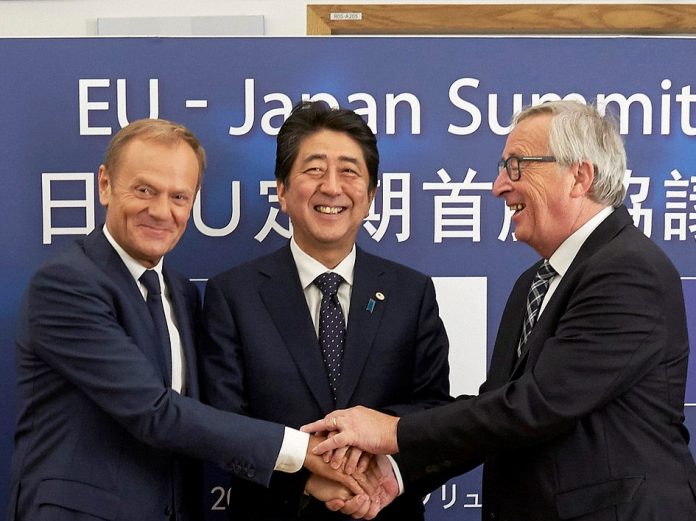The European Union and Japan are celebrating a “historic moment” with the signing of two landmark agreements: the Strategic Partnership Agreement and the Economic Partnership Agreement.
Addressing the 25th EU-Japan Summit on July 17, European Commission President Jean-Claude Juncker said: “Today is a historic moment in our enduring partnership. Today’s signature of the EU-Japan Economic Partnership Agreement is a landmark moment for global trade, and I am also delighted that we have signed the first ever Strategic Partnership Agreement, which takes our cooperation to the next level. The impact of the Economic Partnership Agreement goes far beyond our shores.”
According to Juncker, the EU and Japan are making a statement about the future of free and fair trade.
“We are showing that we are stronger and better off when we work together and we are leading by example, showing that trade is about more than tariffs and barriers,” he said. “It is about values, principles and finding win-win solutions for all. As far as we are concerned, there is no protection in protectionism – and there cannot be unity where there is unilateralism.”
At the summit, Juncker was joined in Tokyo by Donald Tusk, president of the European Council, as well as European Commission Vice-President for Jobs, Growth, Investment and Competitiveness, Jyrki Katainen.
As reported by the Agence France-Presse, the Prime Minister of Japan Shinzō Abe said the agreement “shows the world the unshaken political will of Japan and the EU to lead the world as the champions of free trade at a time when protectionism has spread”.
Without mentioning US President Donald Trump, who alleged the EU has “really taken advantage of us on trade”, Tusk stressed the agreement was intended as a counterpoint to Washington’s current trade policy.
“It’s a light in the increasing darkness of international politics,” Tusk said. “We are sending a clear message that you can count on us, both Japan and the EU. We are predictable, responsible, and will continue defending a world order based on rules, freedom and transparency and common sense.”
According to a European Commission press release, the Economic Partnership Agreement is the biggest ever negotiated by the EU. It creates an open trade zone covering over 600 million people and nearly a third of global GDP. It will remove the vast majority of the €1bn of duties paid annually by EU companies exporting to Japan, and has led to the removal of a number of long-standing regulatory barriers, for example on cars.
“We are sending a strong signal to the world that two of its biggest economies still believe in open trade, opposing both unilateralism and protectionism. The economic benefits of this agreement are clear,” said European Commissioner for Trade Cecilia Malmström. “By removing billions of euros of duties, simplifying customs procedures and tackling behind-the-border barriers to trade, it will offer opportunities for companies on both sides to boost their exports and expand their business.”
It will also open up the Japanese market of 127 million consumers to key EU agricultural exports and will increase EU export opportunities in a range of other sectors.
It is also the first trade agreement negotiated by the EU to include a specific commitment to the Paris climate agreement.
As regards data protection, the EU and Japan concluded the negotiations on reciprocal adequacy, which will complement the Economic Partnership Agreement. They agreed to recognise each other’s data protection systems as ‘equivalent’, which will allow data to flow safely between the EU and Japan, creating the world’s largest area of safe data flows.
“Japan and EU are already strategic partners. Data is the fuel of global economy and this agreement will allow for data to travel safely between us to the benefit of both our citizens and our economies,” said Věra Jourová, Commissioner for Justice, Consumers and Gender Equality. “At the same time we reaffirm our commitment to shared values concerning the protection of personal data. This is why I am fully confident that by working together, we can shape the global standards for data protection and show common leadership in this important area.”
According to a Commission press release, each side will now launch its relevant internal procedures for the adoption of its adequacy finding. For the EU, this involves obtaining an opinion from the European Data Protection Board (EDPB) and the green light from a committee composed of representatives of the EU member states. Once this procedure will have been completed, the Commission will adopt the adequacy decision on Japan.
Reactions from EU lawmakers
Leading S&D MEPs welcomed the signing of the EU-Japan Economic Partnership Agreement. Pedro Silva Pereira MEP, S&D Group rapporteur for the EU-Japan Economic Partnership Agreement said: “Today’s signature is an important step forward. It is now up to the European Parliament, which has been closely involved in the monitoring of these negotiations, to analyse the final text and to listen to all the stakeholders before having the final say.”
According to Pereira, a good trade agreement is one that delivers on sustainable growth, jobs and that brings benefits for citizens and companies. “We will continue to do our part to ensure that this is the case.”

